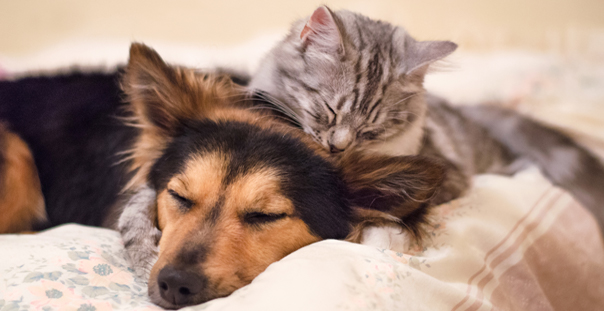Pet Vaccinations

At Thornhill Pet Hospital, we know that keeping your pet up-to-date on their vaccinations is vital to their health. Vaccines are designed to protect pets from a variety of viral and bacterial diseases. Our vaccination protocols are tailored to your pet’s individual needs, depending on their species, age, and lifestyle. Vaccine schedules are based on the recommendations of the AAHA-AVMA Preventive HealthCare Guidelines Task Force and are detailed below for both dogs and cats:
Canine Core Vaccines:
The DHPP vaccine protects your puppy or dog against several diseases, including:
- Distemper: a life-threatening disease that is hard to treat and extremely contagious
- Hepatitis (infectious): viral disease that is very contagious and causes liver failure and ocular damage
- Para influenza: a disease of the respiratory system
- Parvovirus: a highly contagious and often fatal virus that can remain in the environment for more than a year
- Rabies: an incurable virus that affects the central nervous system. Most cities in the United States require regular rabies vaccination to protect both dogs and people.
Canine Non-Core Vaccines:
These vaccines are typically recommended for pets with a higher risk rate, such as those that are outside often and come in contact with other dogs and animals
- Canine influenza: We highly recommend CIV for all dogs, and it is required for those that wish to take advantage of our boarding, grooming, and daycare services. Canine flu is highly contagious and some of its carriers do not show symptoms. We offer the bivalent flu vaccine, which protect against the H3N2 and H3N8 strains of the virus. A booster is required 3 weeks after the first injection. Symptoms of canine flu include elevated temperature, ocular and nasal discharge, coughing, and lethargy.
- Bordetella/canine cough (formerly called kennel cough): spread through coughing. Dogs can be infected just by being close to an infected dog. However, there is an increased risk in boarding facilities, grooming establishments, veterinary clinics, and dog shows. The vaccine is given either every 6 months or every 12 months depending on your dog's lifestyle.
- Canine flu (canine influenza): bacterial disease that affects the kidneys and the liver. The Leptospira bacteria is found in puddles of water or wet grass that have been contaminated by infected dogs or wildlife. The bacteria can also be spread by infected sea mammals and can affect dogs that go to our beaches. Leptospirosis is a human health hazard as well because it is transmitted to humans by contact with the urine of an infected dog or other mammal.
- Leptospirosis: spread by ticks to dogs and people. It is recommended for dogs that visit areas where ticks are found, including the trails and parks in Oakland and surrounding areas.
- • Lyme disease: spread by ticks to dogs and people. It is recommended for dogs that visit areas where ticks are found, including the trails and parks in Oakland and surrounding areas.
Feline Core Vaccines:
Dr. Yang recommends FVRCP vaccination for all cats (indoor/outdoor and indoor only). This vaccine protects cats from several viral diseases, including:
- Rhinotracheitis and calicivirus: both cause upper respiratory tract infection
- Feline panleukopenia: often called feline distemper. This disease is hard to treat and often fatal. Symptoms include vomiting, lethargy, severe dehydration and fever. This vaccine is an effective way to protect your cat from this disease.
Feline Non-Core Vaccines:
Cats that go outside also need the following vaccines:
- Feline leukemia virus: Feline leukemia is the leading cause of death for cats in North America. Dr. Yang recommends this vaccine for all cats that go outdoors. If your cat has never received this vaccine, a series of two vaccinations are administered 2-4 weeks apart, and then boosted on an annual basis. If your cat has been outside and not vaccinated, a feline leukemia and a feline immuno suppressive virus test (done in-house) is recommended before vaccinations are administered.
- Rabies: transmitted by wild animals that have been infected with the virus. Rabies is always fatal. In our practice at this time, we use Purevax Feline Rabies by Merial. This vaccine is not adjuvanted for increased safety.
When your pet comes in to receive their vaccinations, we’ll discuss their specific lifestyle and medical requirements with you to ensure that they’re receiving the protection they need. If you have any questions about pet vaccines or if you’d like to schedule an appointment to have your pet vaccinated, we invite you to give us a call at 510-339-2041.

